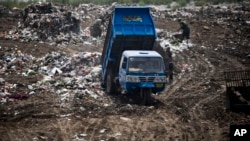China notified the World Trade Organization (WTO) on Tuesday that it would stop accepting shipments of trash such as waste plastic and paper as part of a campaign against "foreign garbage."
The import ban, which will enter into force by the end of 2017, will also cover slag from steel-making, and many kinds of waste wool, ash, cotton and yarn.
"We found that large amounts of dirty wastes or even
hazardous wastes are mixed in the solid waste that can be used as raw materials. This polluted China's environment seriously," China's WTO filing said.
"To protect China's environmental interests and people's health, we urgently adjust the imported solid wastes list, and forbid the import of solid wastes that are highly polluted."
China is a major importer of waste. Last year it imported 7.3 million tons of waste plastics, valued at $3.7 billion, accounting for 56 percent of world imports. Apart from Hong Kong, the biggest sources of that plastic waste were Japan and the United States, which accounted for roughly 10 percent of the volume each, according to data from the International Trade Center, a United Nations-WTO joint venture.
The same two countries are also the main sources of scrap paper going to China each year, accounting for half of the almost $1 billion business between them.
China's speedy industrial development has seen it struggling to regulate waste disposal, leading to toxic waterways and cities blanketed in smog.
China plans to conduct a nationwide survey of pollution
sources, and has urged local authorities to speed things up by launching local investigations by the end of July, the Ministry of Environmental Protection said on Monday.





